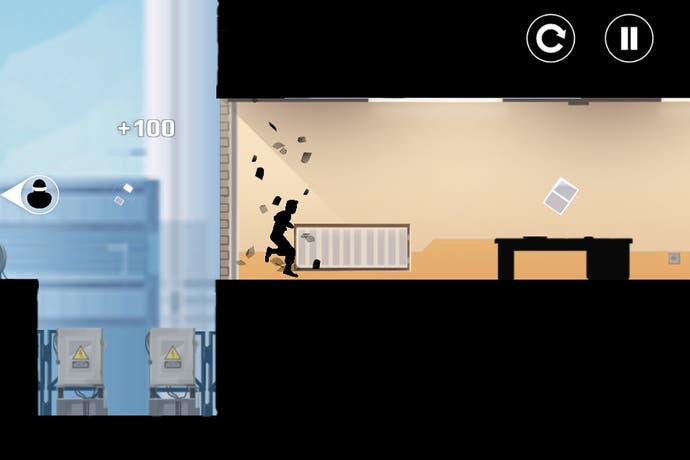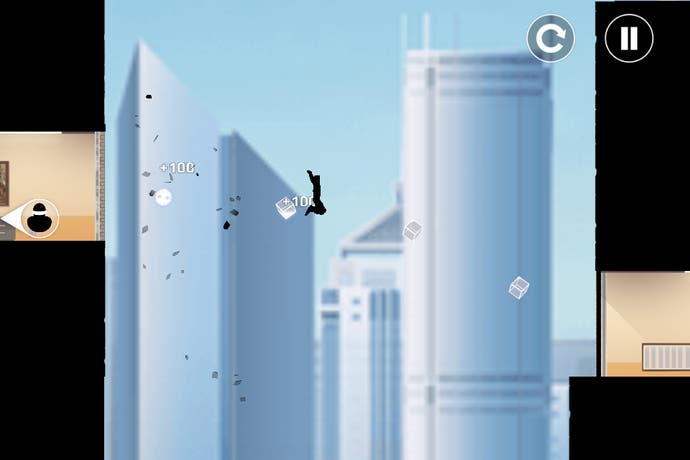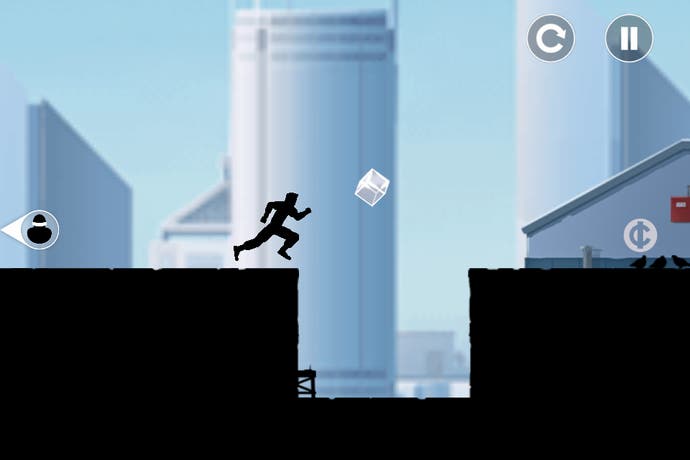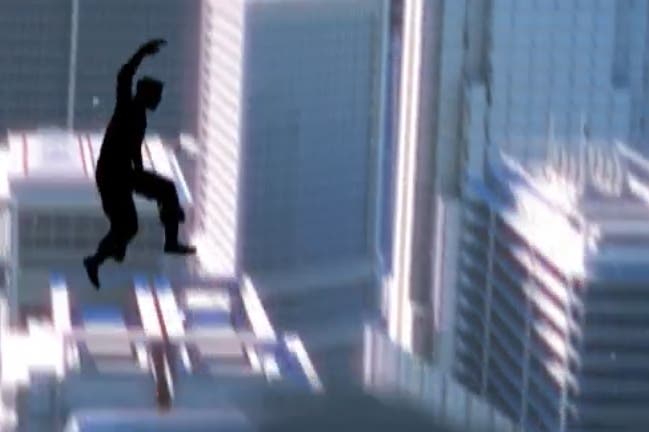Vector review
Jump, man.
The arrival of phones and tablets as gaming's new wild frontier has thrown up plenty of debate about the difference between iteration and imitation, but if you want a neat case study of how inspiration can make a game better, take a look at free-running platformer Vector.
From the silhouetted character to the way he leaps and scrambles across rooftops, it's undeniably a game following in the footsteps of Canabalt. Yet for all its similarities, Vector is its own game and builds on Adam Saltsman's template with confidence.
Following a stark yet stylish opening in which we see our nameless hero break away from the corporate, Orwellian drudgery of his futuristic workplace, attracting the attention of fascistic pursuers in the process, we're plunged into a beautifully realised and animated world.
Our input is reduced to simply using the touch-screen to tell him when to jump, when to roll and when to sprint with simple up, down and right swipes of the finger. What matters is the timing, as there's a ruthless guard on your tail and if he catches you, you're electrocuted.

Right from the start, however, it's a tactile pleasure to be chased. There's a natural fluid flow to the movement, and the attention to detail is a delight. Jump too early and your avatar scrambles to find his footing on the other side. Jump too late and what could have been a graceful leap over an inconsiderately placed vent becomes a clumsy tumble that hands your pursuer vital inches of ground. Touch-screen control means you feel every move at a more visceral level. Frantically swishing horizontally to get enough speed before swiping up for a breathtaking leap into the unknown is far more immersive than if you'd simply pressed a button.
Here, the style is the substance. You could make the exact same game with a less flamboyant look and the gameplay wouldn't have to change at all. But then you wouldn't get that cinematic thrill of hurling yourself into space, crashing through a window or somersaulting off a water tower. Witness the way a slight difference in launch trajectory changes the kind of acrobatics you pull off, or the way the man chasing you slumps and wheezes if you make it to the safety of the level's end. There's humanity in every movement, which sells the primal urgency of the otherwise barren chase narrative.
There's structure here, too. Unlike Canabalt, this isn't an endless runner made up of random obstacles. You're scampering through strictly defined levels, sometimes with multiple routes, trying to earn the full three-star rating by finding bonus icons and hitting specific stunt points.

You're also earning credits, which are used to unlock more advanced parkour moves. You don't technically need them all, but without them you won't be getting all the points from each level, reducing your star total and making it harder to access later stages. Mostly, you'll want to save up for these moves because - like so much in Vector - they look really cool.
It's here that micro-transactions slink into view, but they've been kept carefully separated from the gameplay. You can get 5000 credits for 69p all the way up to 85,000 for £14.99, but all these allow you to do is unlock all the moves. It's still up to your skill and timing to put them to good use. You won't be progressing in this game unless you're actually good at it, no matter how much money you throw at its store front.
And progression is far from easy. Moving from the opening Downtown stage to the Construction Yard that follows requires 25 stars, which means getting two- and three-star ratings on most of the Downtown sections. That's harder than it sounds, thanks to increasingly tricky layouts and well hidden bonuses that offer little room for error. Frustration can definitely seep in, even as those white-knuckle replays remain fun thanks to the game's tactile aplomb.

It's here that Vector's graceful poise crunches somewhat jarringly into the concrete edifice of traditional game design. Having fixed levels means that you can perfect your run and really get some muscle memory going. At the same time, when you hit a wall (metaphorically rather than literally) you'll find yourself crying out for a less restrictive mode where you can simply enjoy the pleasures of running, jumping and rolling without the pressure of being captured, missing a bonus or earning those last few stars needed to move on.
That's not enough to do much more than scrape the knees of an otherwise effortlessly entertaining game, though. Vector is a joy to behold on the iPhone, but an absolute dream on a Retina-screened iPad. A rare example of a game where the pleasures of the gameplay are intrinsically tied to the way it looks, Vector is the sort of game you'll keep to hand as much to impress others as to amuse yourself.

